In the decade following the water crisis' beginning, Flint's school district has suffered
In the 10 years since the water crisis poisoned Flint families, the city's school district has suffered.
Students left in droves. Graduation rates have plunged. Reading scores have fallen. And buildings have sat vacant.
Officials blame many of the district's challenges, particularly declining enrollment and a larger proportion of special education needs, in part to the water crisis, which spun the city and residents into an ongoing nightmare. Leaders, too, have also credited more than a decade of inadequate state funding for pushing Flint's schools into a downward spiral. And through all that, charter schools drew away more and more students: 14 charters in Genesee County, 11 of those in Flint, serving more than 5,000 students, according to state data.
The district now finds itself with $56 million in bonded debt, and called earlier this year for debt relief from the state in a public news release. A former teacher described building issues in her school while many community members in the past year have pleaded with members of the school board — which has cycled through its own dramas, including the reported assault of one board member at the hands of another during a public meeting in 2022 — to do something about the more than 20 former school buildings in the community sitting unused and sliding into blight. Buildings like Flint Central High School, a mammoth campus closed in 2009, which sits empty and dilapidated next to the city's shimmering new library and institute of arts.
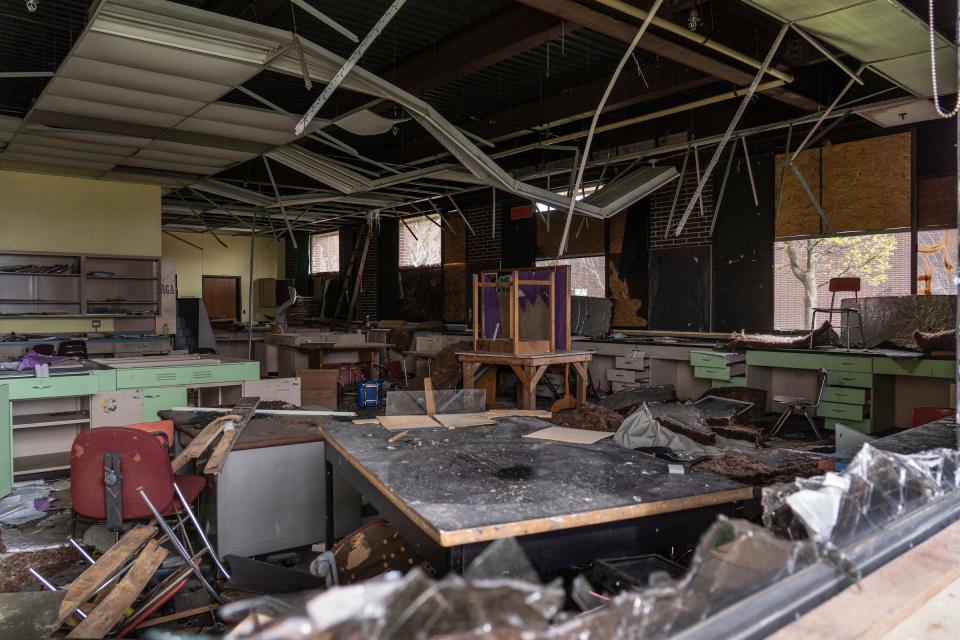
Many of these problems are not uncommon among school districts in Michigan, but they have seemed to pile up for Flint, where big jugs of water are still hauled into schools for students and staff members who do not trust the tap.
"We need a change of heart: What is right for the generation behind us?" said Joyce Ellis-McNeal, president of Flint's school board. "Who are we fighting for?"
What it would take to reverse course in Flint Community Schools is unclear. But many residents and leaders have ideas.
Ellis-McNeal, of Flint, believes the city's children need new schools where they can feel cared for: nice buildings students can walk to rather than a handful of aging buildings only reached by long bus journeys. Nadia Rodriguez, a former teacher who left after five years at the end of the last school year, said Flint needs more certified teachers and better pay so they'll stay. State schools Superintendent Michael Rice said Flint needs to rightsize the district, with newer and fewer buildings to better manage its resources. Leo Robinson II, a community pastor, said Flint needs better mental health supports for students struggling and basic help for hygiene issues that keep students from showing up to school.

Despite its list of challenges, in Flint this school year, there is optimism, and it's not unfounded, said Rice. There are signs of hope he said: Flint gained 107 students between this year and last school year, according to district enrollment data. Kevelin Jones, the district's fifth superintendent in 10 years, said the current board is working in partnership with him to lead the district in a more organized way.
Flint has a plan, he said.
"Our board is concerned with making sure that we're doing things in the community to bring the community back," Jones said during a news conference in early April.
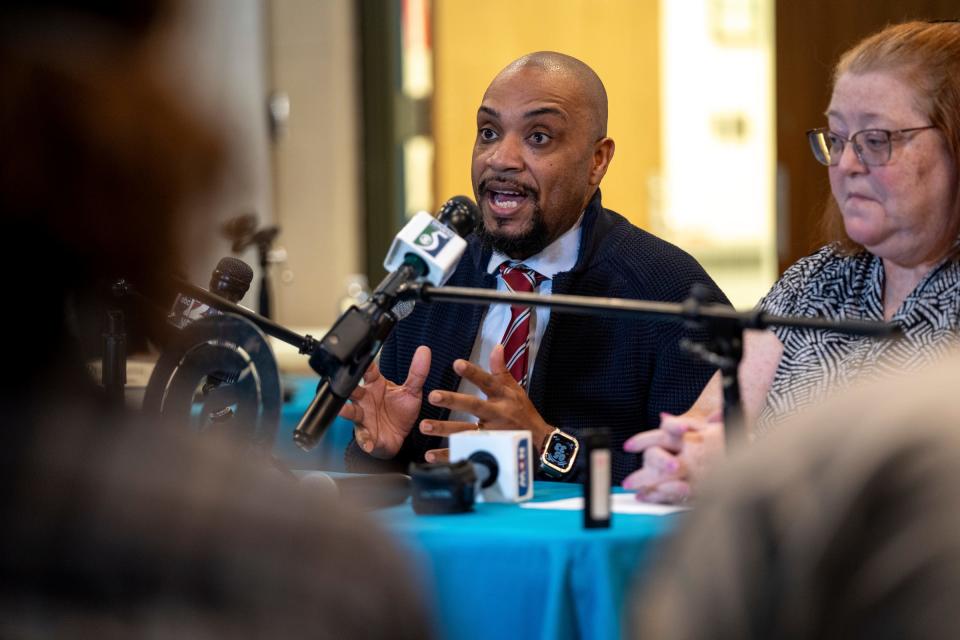
Plunging enrollment, closed buildings
The school district's population has declined by nearly 3,600 students in nearly a decade — from 6,533 in the 2014-15 school year to 2,942 this year, a 55% decline. The loss of students is more staggering looking further back: In the 2004-05 school year, 19,025 students attended Flint schools, according to state data.
In two decades, the district has shuttered more than a dozen school buildings, with plans to close at least four more buildings over the next three years. Rice, the state superintendent, urged the board at a November meeting to continue closing buildings and expedite the process, arguing that having too many buildings negatively impacts teachers.
For example, about 250 students attend Doyle Ryder Education Center, a pre-K-6 school, with about 31 students in each grade, he said. The school building is designed for a capacity of 650. The school can't have 31 students in a class, but cut in half, 15 students in each class spreads Flint's resources too thin, he said.
"The more you spread out your resources in buildings, the more you're going to inefficiently staff and that's where the money is," he told the board.
Children on their way to school pass closed school buildings, Ellis-McNeal said. And Flint's children deserve better than that, including refreshed and new schools, instead of the older buildings where they learn now.
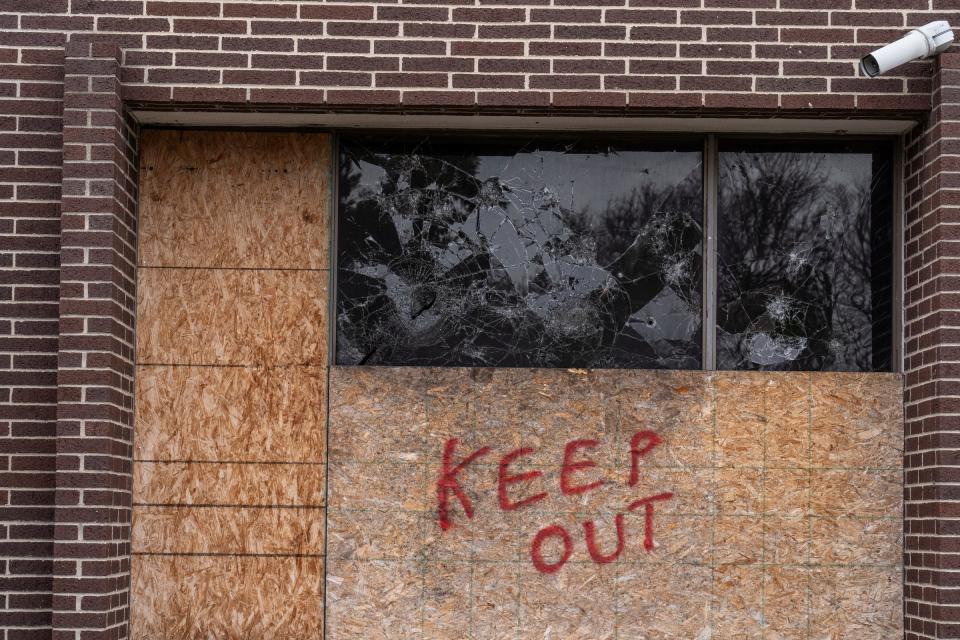
"Kids learn better when they walk to school," she said. "They shouldn't be on the corner at five or six in the morning ... when they can walk."
Getting teachers in front of students
The district's graduation rate has also tumbled. In 2023, 35% of Flint's students graduated in four years, compared with 58% in 2014. Just 25 of 279 third graders tested proficient or higher last spring on the state reading M-STEP, while the majority, 218 third graders, scored not proficient on the test.
Academics are a major concern for parents. Neneia Stewart, of Flint, said she's generally happy with how her three younger children have fared at Durant Tuuri Mott Elementary, a Montessori program within the district. But the pandemic was hard for the kids, she said, noting that her older child at a different school "didn't even make it to the next grade," and was held back.
And sitting in the back seat of the family car after school pickup on a warm spring day, her 9-year-old piped up during an interview with the Detroit Free Press. He didn't like school, he said, because he hadn't seen his teacher in school for a long time. A substitute is at the head of the classroom.
That's not unusual, Rodriguez, a former Durant Tuuri Mott teacher, said.
Rodriguez joined the district six years ago from a private school, taking a $16,000 pay cut, from $48,000 a year to $32,000 a year. Rodriguez felt dedicated to Flint and wanted to serve its students, and expected annual pay bumps promised in the teachers union contract as she gained seniority. What she didn't expect was years of pay freezes or step freezes, which kept her classified under the same level of experience, and same salary, for years.
She didn't expect the pipes in her classroom to burst, or for the district to fail to clean carpets after flooding, creating a mold issue.
She was frustrated not only by pay freezes, but by a lack of support. One year, the school didn't have certified teachers for multiple grades, she said. The district didn't seem to post or fill open positions quickly. She said she didn't know what to say when folks asked her whether their child would have a teacher in their classroom.
"I had to be honest: 'I don't know if you'll have a teacher,' and it was heartbreaking," she said. "It felt horrible."
Bridgett Jones, a spokeswoman with the district, wrote in an email to the Detroit Free Press that the district's struggle to hire and retain educators mirrors a larger, nationwide teacher shortage. The mold claims, she wrote, are "under review."
Rodriguez is no longer in education after leaving her teaching job at the end of last school year.
This school year, Flint's school board rejected a proposed agreement between the teacher's union and school district, kicking off months of protests, including a sick-out protest that closed schools for a day in March, and tense negotiations between the two parties, reported Flint Beat. In April, the district and union announced they'd made an agreement, one that restores teachers back to the salary steps where they belong, after years of freezes.
Karen Christian, president of United Teachers of Flint, which represents Flint's roughly 160 teachers, said the new agreement should help keep teachers like Rodriguez and hopefully attract new, qualified educators, too.

"We don't want to lose them to districts that are offering more," she said. "This way, these teachers are restored back to where they should be on the salary schedule, which honors them and their time in this district to keep them here."
The district in the past decade has also had to grapple with a higher proportion of students with disabilities, with 24% of the student population this year designated as students with disabilities. In 2013, students with disabilities comprised 15% of the district's student population. Officials attribute this high proportion to the water crisis, and the lasting repercussions of lead-tainted water on children.
Christian is also a sixth grade teacher at Potter Elementary. Teachers have noticed that it's harder to keep younger students focused for more then 10 minutes, she said in an interview with the Detroit Free Press.
"We have a whole generation of students that are impacted because of this," Christian said. "So it had a tremendous impact on the ability of our students to stay focused for longer periods of time."
Researchers with the University of Michigan published a study in March that found the water crisis had a sweeping effect on Flint's school-age children, finding children were substantially behind in math in particular after the crisis. Brian Jacob, a professor of education policy at U-M, said the researchers compared Flint student achievement with similar school districts and cohorts of similar students.

"Their academic achievement was operating on the same trend as Flint's before the water crisis," he said. "Afterwards, they diverge."
A plan to move ahead
Jones said the district has been in talks with state leaders about getting more money to Flint schools, but would not say who. It's also unclear whether state leaders will consider a request to relieve Flint's $56 million debt. State lawmakers approved debt relief for the Benton Harbor School District, Muskegon Heights Schools, Pontiac Community Schools and Ypsilanti Community Schools, with the highest amount of relief at $31.3 million.
But Flint's debt is different: It's financed through school bonds, paid through local property taxes. Without the debt, Flint could have more room to ask voters to approve new bonds, which would pay for more school renovations. Debt relief, Jones argued in a news release in January, would "have a ripple effect on the larger community," giving the district resources to demolish some of the blighted schools in neighborhoods in Flint.
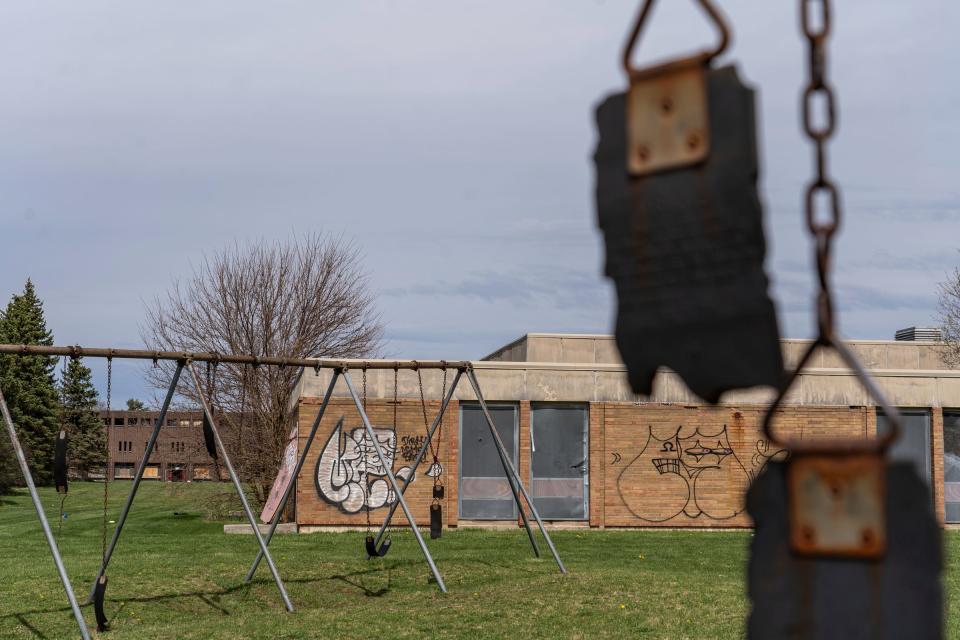
Flint is trying to improve its buildings, Jones said during an April 10 news conference. The district spent some federal pandemic relief funds on school renovations, he said, and by the next school year, four buildings will be renovated. State data shows that the district spent about $34 million on facilities, though the data might not be fully updated.
But Flint also needs more students to fill its remaining buildings. The board and Jones are working on that too, he said, with plans to hold enrollment events to aggressively attract more families away from charter schools and back to the community district.
Rice said he thinks debt relief, along with help from local foundations, could help Flint get new schools built and attract more students to enroll. The name of the game, Rice said, is "newer and fewer buildings."
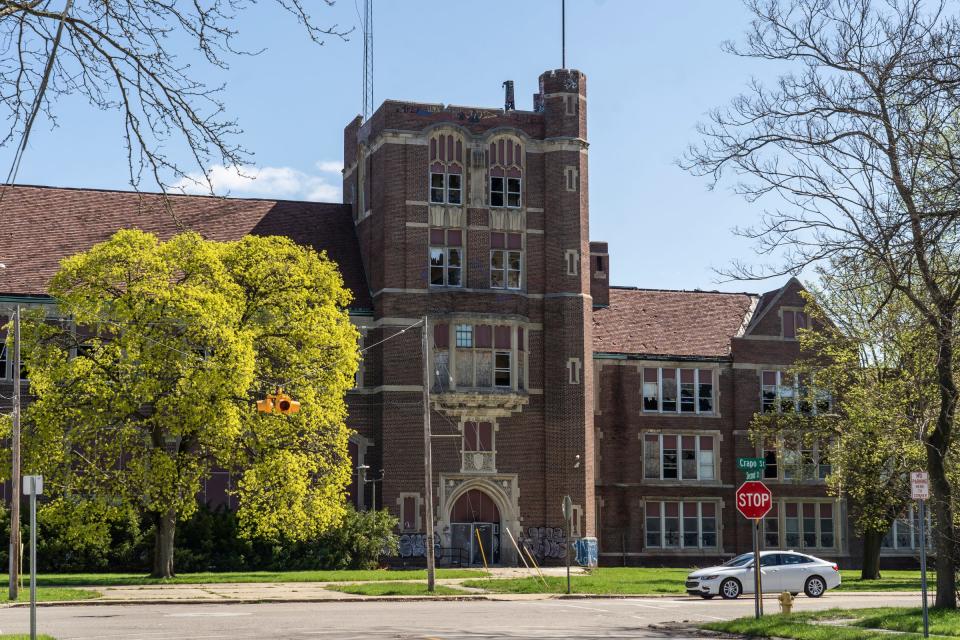
"Not simply fewer, but newer as well, ideally," he said.
To Jones, the district is taking the needed steps.
"We're fixing what we can fix to do what's best for the community and the scholars," he said during the news conference. "It's going to take some time."
Contact Lily Altavena: laltavena@freepress.com.
This article originally appeared on Detroit Free Press: Flint schools have suffered in decade after water crisis began

